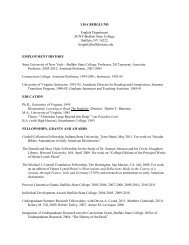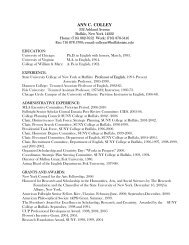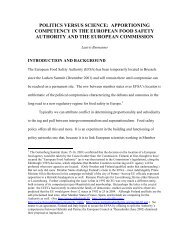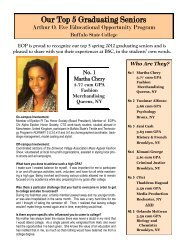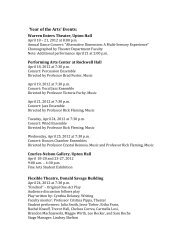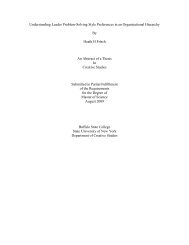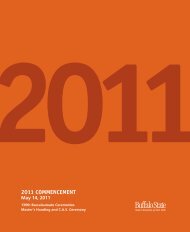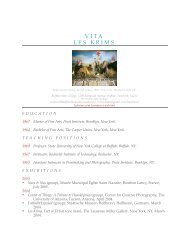Arts - Buffalo State College
Arts - Buffalo State College
Arts - Buffalo State College
Create successful ePaper yourself
Turn your PDF publications into a flip-book with our unique Google optimized e-Paper software.
118<br />
Psychology and Social Sciences<br />
weather was great while on vacation?” The question asked about the<br />
characters, with answer choices ranging from (1) definitely [Person<br />
1’s name], (4) either one, to (7) definitely [Person 2’s name].<br />
Consistent with our prediction, we found that comprehenders use<br />
gestures to help guide pronoun comprehension, where a consistent<br />
Person 1 gesture biased interpretations to that character and likewise<br />
for Person 2 gestures.<br />
Presentation Type and Session: Oral – Social Sciences<br />
McCarthyism: A Look At the History and<br />
How It Relates To America Today<br />
Kevin Murphy and Brianna Murphy, HON 400: All <strong>College</strong><br />
Honors Colloquium<br />
Faculty Mentors: Professor Albert Michaels, History and Professor<br />
Andrea Guiati, Director, All <strong>College</strong> Honors Program<br />
From the 1940’s to late 1950’s, there was the second Red Scare<br />
in American history. Led by Senator Joseph McCarthy, and through<br />
intense investigations and questioning, thousands of citizens<br />
were accused of being Communists or Communist sympathizers.<br />
Many of the people in question were innocent, but the mere<br />
association to Communism at this time led to the loss of jobs, or<br />
even imprisonment in some cases. Since 9/11, the government<br />
has instituted policies that limit freedom in order to investigate<br />
terrorism more thoroughly. There are similarities between the era<br />
of McCarthyism and the present day Patriot Act. Through looking<br />
at articles written by respected scholars and reading the works of<br />
acclaimed authors, we intend to look into each subject area with a<br />
compare and contrast mentality. By critiquing and analyzing the<br />
different viewpoints of various historians, this will allow us to come<br />
to our own conclusion regarding the subject matter. Through our<br />
completed research, we will be able to show whether or not the<br />
government is too often using excessive power on innocent people for<br />
the protection of others and how the taking away of freedoms reflects<br />
upon the rights that were given to all U.S citizens in the Constitution.<br />
Presentation Type and Session: Poster I<br />
Mind Or Body: Willingness To Undergo<br />
Predictive Medical and Psychological<br />
Testing<br />
Mark Zdrojewski, Psychology<br />
Faculty Mentor: Professor Howard Reid, Psychology<br />
There is little research into the psychological profile of<br />
individuals that choose to undergo predictive genetic testing, or<br />
which category of predictive testing they would be most receptive<br />
to exploring: genetic predisposition for psychological or medical<br />
conditions. The current research was designed to address these<br />
issues. Additionally, we examined whether the medical and<br />
psychological history of the individual and his/her family would<br />
also influence their willingness to undergo testing. The study<br />
included 143 college students recruited from summer session<br />
classes. A questionnaire was used to measure personality traits,<br />
health history, willingness to undergo predictive genetic testing, and<br />
demographical data. The multiple regression analysis was performed<br />
using 10 predictors for the two criterion variables: willingness to<br />
undergo psychological (WP) and willingness to undergo medical<br />
(WM) predictive testing. Of the 10 predictors in the model, two had<br />
significant regression weights (p < .05), family medical history<br />
and conscientiousness after controlling for the other variables in<br />
the model. Interestingly, family medical history was negatively<br />
correlated both WP and WM. Thus, when a participant had a<br />
higher number of medical conditions in their family health history,<br />
they were less willing to undergo predictive genetic testing. Also,<br />
conscientiousness was a predictor of whether a person was willing<br />
to have a psychological test, but not medical. Interpretations of these<br />
significant results will be discussed further in a discussion of the<br />
research.<br />
Presentation Type and Session: Poster I<br />
The Motivations For Success of African<br />
American Male Students Enrolled At<br />
<strong>Buffalo</strong> <strong>State</strong> <strong>College</strong><br />
Ahmad Islam, Sociology<br />
Faculty Mentor: Professor Amitra Wall, Sociology<br />
The purpose of this study is to explore the motivations for<br />
success of African American male students enrolled at <strong>Buffalo</strong> <strong>State</strong><br />
<strong>College</strong>. According to enrollment data for <strong>Buffalo</strong> <strong>State</strong> <strong>College</strong>, 618<br />
or 6.3 percent out of the 10,002 students enrolled during fall 2011<br />
semester are African American males. Due to the aforementioned<br />
statistic this researcher will explore what it is like to be a numerical<br />
minority at the largest comprehensive college located in an urban<br />
setting. Conflict perspective and critical race theory will be the<br />
framework of this study. Face to face interviews will be conducted<br />
during the spring of 2012. Participants will define success, identify<br />
long and short-term goals, and share what motivates them to<br />
succeed. The overall research questions for this study include the<br />
following: How do African American males define success? What<br />
motivates African American male students to succeed?<br />
Presentation Type and Session: Poster III<br />
Participatory Action Research In Peru’s<br />
Ancash Province<br />
Edward Lazzaro, ANT 499: Independent Study in Andean Medical<br />
Anthropology<br />
Faculty Mentor: Professor Lisa Anselmi, Anthropology<br />
During my trip this past January to the city of Carhuaz in the<br />
Ancash province of Peru, I was intrigued by the inhabitants, known<br />
as the Quechua, and their relationship with the land. My research<br />
questions revolve around the Quechua and similar cultures in the<br />
region and their religious practices, especially those that include the<br />
use animals and animal parts, and I am exploring this through the




